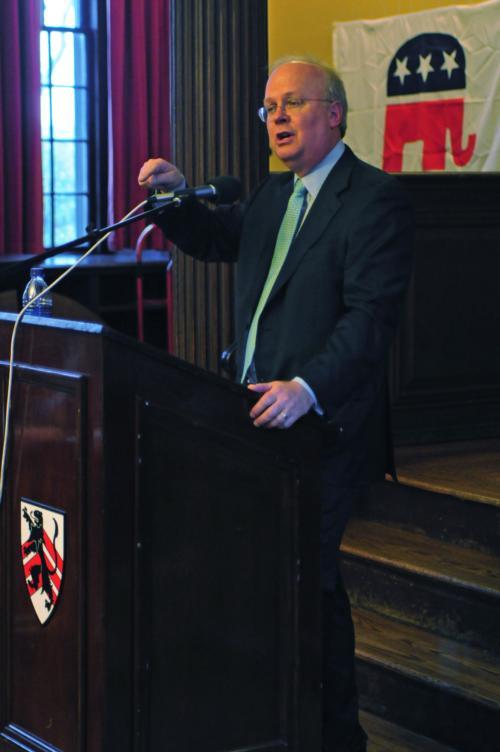
News
Summers Will Not Finish Semester of Teaching as Harvard Investigates Epstein Ties

News
Harvard College Students Report Favoring Divestment from Israel in HUA Survey

News
‘He Should Resign’: Harvard Undergrads Take Hard Line Against Summers Over Epstein Scandal

News
Harvard To Launch New Investigation Into Epstein’s Ties to Summers, Other University Affiliates

News
Harvard Students To Vote on Divestment From Israel in Inaugural HUA Election Survey
Karl Rove Says History Will Vindicate Bush

Karl Rove, who served for years as the top political adviser to President Bush, was at Harvard on Friday speaking to a crowd of about 200 in Winthrop House. The Crimson sat down with Rove for a brief interview before the event.
The Harvard Crimson: President Bush’s approval ratings are now in the low 30s. Why do you think his approval ratings are so low?
Karl Rove: We’re in an unpopular war, and he’s been on the receiving end of constant attacks over the past three years from Democrats, including a whole field of Democratic presidential contenders. History is going to judge him, and the American people will come to judge him very favorably for having done the right things at a difficult time for our country.
THC: Would you advise Bush any differently now from how you did then?
KR: There are things that I wish we had done differently in order to explain our message to confront the people who are distorting his record, but he did the right things from a policy perspective. It was important for the president to take on the issue of Social Security and the necessity of modernization. It was vital that we prosecute the war with a goal of victory. It was important for the president to appoint very qualified people to the Supreme Court.
THC: Following President Bush’s 2004 victory, you said that you envisioned the start of a “permanent Republican majority.” Do you think the political landscape has changed since then?
KR: I think one party or the other is going to gain the upper hand. I think it’s going to be the Republican Party. If you look at the 2006 election, it was a normal off-year election. The White House party loses an average of 29 seats in the House and 5 in the Senate. We lost 30 in the House and 6 in the Senate, and we lost them by very, very close margins. And that’s with us suffering scandals galore. We lost 15 seats that are directly or indirectly connected to scandal. We are in the middle of an unpopular war, and we had those scandals, yet it was an average election. That says something about the durability of the Republican message.
THC: Why do you think people criticize you so frequently and protest at your speeches?
KR: I like to focus on the positive side. I’ve been surprised with the civility with which I’m mostly met. There are always occasional nuts. It’s generally the older townies when I go to campuses that are the more raucous ones. Or the older townies that are the 9/11 deniers, that kind of thing.
THC: If you could advise our generation about one thing we should change about American politics in the future, what would it be?
KR: The sense that once an election is over, the election is over. I come from Texas. Politics is a blood sport, but once an election is over, people try to put politics aside. What amazed me about Washington was that people would sit in my office who were Democrats that would say, ‘I’d like to work with the administration on solving X, but I can’t because my caucus won’t let me.’ People of good will can find ways to rule the country together, maybe not exactly precisely the same way they would if they had their own way, but nonetheless be able to move the country together.
Want to keep up with breaking news? Subscribe to our email newsletter.
